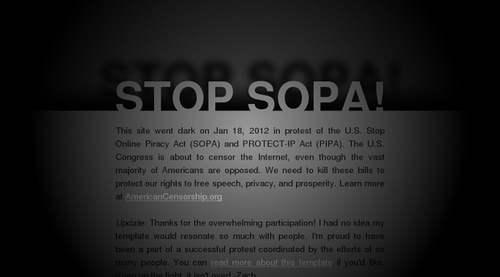By Nick Ubels (The Cascade) – Email
Print Edition: January 25, 2012
Widespread Internet blackouts on January 18 have finally brought oppressive new internet regulation bills SOPA and PIPA (currently being tabled in U.S. Congress) into the public eye. A number of critical co-sponsors have dropped their support and President Obama has pledged to veto the bill (as it stands) should it pass through Congress. But that doesn’t mean the fight is over.
Mainstream media outlets finally took notice when Wikipedia, Reddit, and other popular domains blocked access to their content for up to 24 hours in protest of the restrictive new measures currently under consideration. SOPA, or the Stop Online Piracy Act, in its current form, would force IPs to block access to any website accused of illegally hosting or linking to copyright content. This includes content posted by users and would be especially detrimental to social networking sites like Facebook, Twitter, and YouTube. Essentially, the bill would cede control of Internet censorship in the United States over to corporations.
It makes the scope of China’s restrictive Internet policies look quaint by comparison.
Lest we Canadians think such a bill would leave us unaffected, we should keep in mind that Internet regulation is not bound by national borders. Under current legislation, Richard O’Dwyer, British webmaster of the TheTVShack, a website that did not host, but merely linked to external content, faces extradition to the U.S., where he will face up to five years in federal prison. SOPA and PIPA would only open the possibility of such cross-border indictments further.
And there are rumblings that the Conservatives are prepared to introduce new anti-piracy legislation that would not only make it illegal to rip your own DVDs, but provide police live access to anyone’s Internet activity without requiring a warrant.
It’s like SOPA and the Patriot Act all wrapped into one freedom-killing measure. The passage of SOPA and/or PIPA would only embolden Harper to give in to increasing pressure from U.S. media conglomerates to crack down on copyright infringers.
This is not to say that online piracy isn’t an issue worth considering, but such desperate, sweeping measures threaten to severely restrict the freedom of expression afforded by the Internet and unravel the foundation of our fastest growing economic sector.
The crux of the problem is an entertainment industry that took far too long to adapt to changes in technology. The bill has strong support from the RIAA, the film industry and half of the gaming industry. But it’s not the content creators and artists who support SOPA/PIPA: it’s the companies that profit from them who are upset that they can no longer pay artists such small kickbacks from sales.
It is true that artists working outside the system may be unlikely find the lucrative careers enjoyed by the upper echelon in years past, but many more are finding moderate success with sustainable, independent distribution models. Comedian Louis C.K.’s recent independent, digital release of his special, Live at the Beacon Theater brought in over $1 million in just 12 days. While not every artist can expect such astounding success trying to make it on his or her own, it proves a simple fact that is not sitting well with the old guard of the entertainment industry: they are no longer needed.
Record labels, movie studios and their ilk, for the most part, have not adapted to the Internet’s new model of commerce and are using the last vestiges of their dying capital to force this Luddite, anti-innovation, anti-Internet, freedom-stifling bill together so that things can go back to the way they were. But things can’t go back to the way they were. These companies have made themselves irrelevant by refusing to adapt.
The big question is whether U.S. lawmakers will give in to the tremendous pressure from corporate lobbyists, or listen to what the people and creators would like to see – it is, after all, their work that’s being “pirated.”


